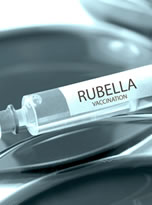Read and report vaccine reactions, harassment and failures.
Who is at highest risk for complications from Rubella?

For most people, rubella is a mild, self-limiting illness; however, a woman who develops rubella during the first three months of pregnancy has a greater chance of miscarriage and of giving birth to a baby with congenital rubella syndrome (CRS) and birth defects.
Infants with CRS can have multiple health issues affecting nearly all organs of the body, including deafness, vision impairments, cardiac defects, microcephaly, neurological abnormalities, developmental delays, and more. Up to 85 percent of infants exposed to rubella in the first eight weeks of fetal development are at risk for CRS. By 12 weeks, the risk decreases to 50 percent and by 20 weeks, the risk is essentially zero.
In 2019, there were six reported cases of rubella in the U.S. and one reported case of CRS in the U.S.
IMPORTANT NOTE: NVIC encourages you to become fully informed about Rubella and the Rubella vaccine by reading all sections in the Table of Contents, which contain many links and resources such as the manufacturer product information inserts, and to speak with one or more trusted health care professionals before making a vaccination decision for yourself or your child. This information is for educational purposes only and is not intended as medical advice.



